32+ Sample Catering Contract Templates
-
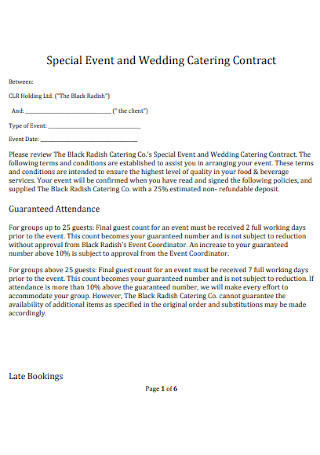
Wedding Catering Contract
download now -
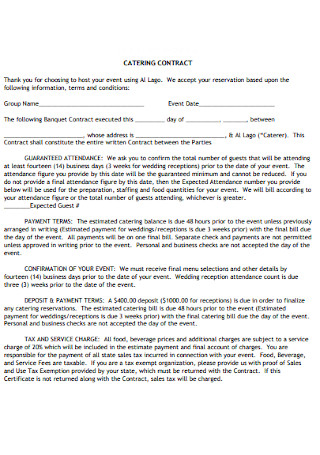
Restaurant Catering Contract
download now -
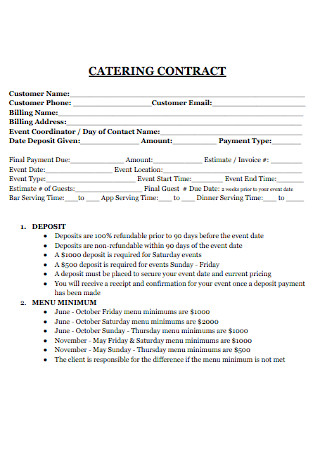
Pizza Catering Contract
download now -
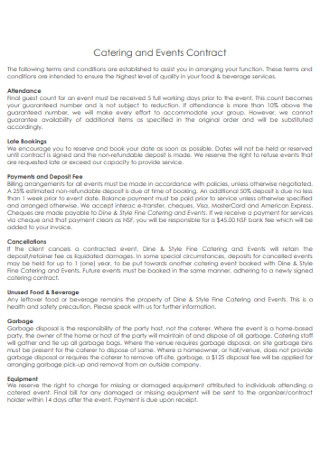
Catering and Events Contract
download now -
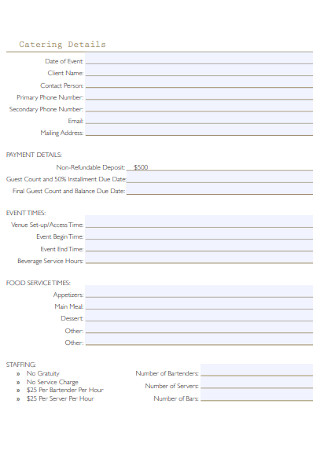
Off-Site Catering Contract
download now -
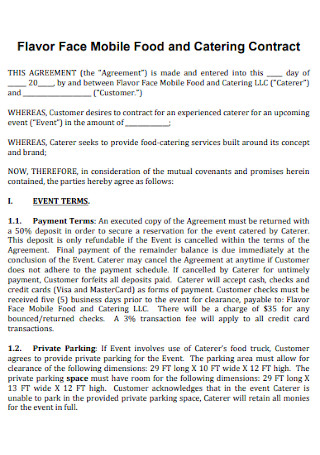
Face Mobile Food and Catering Contract
download now -
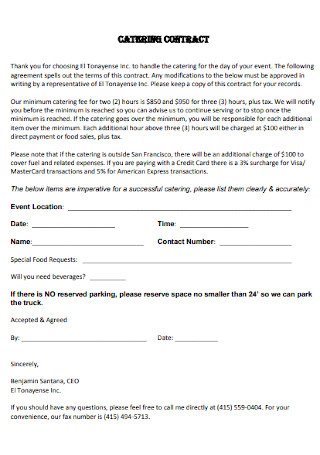
Sample Catering Contract Template
download now -
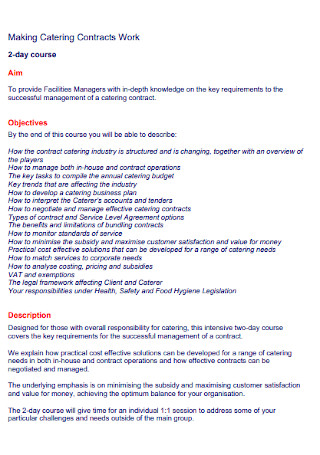
Catering Work Contract
download now -
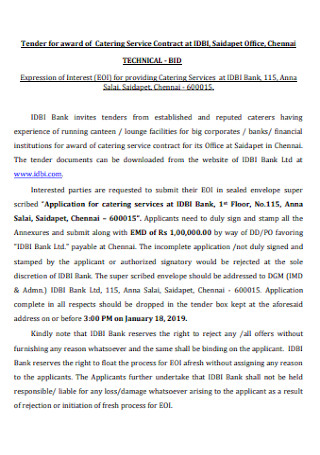
Catering Service Contract
download now -
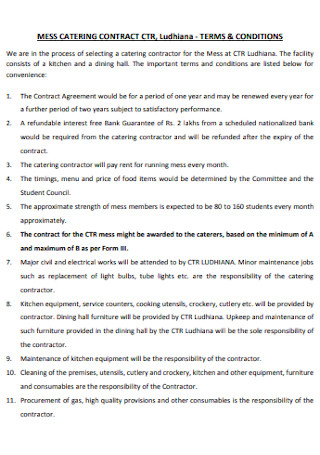
Mess Catering Contract
download now -
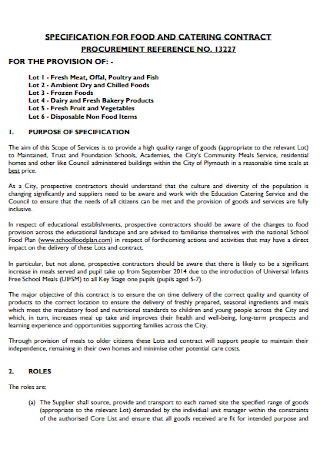
Specification for Food and Catering Contract
download now -
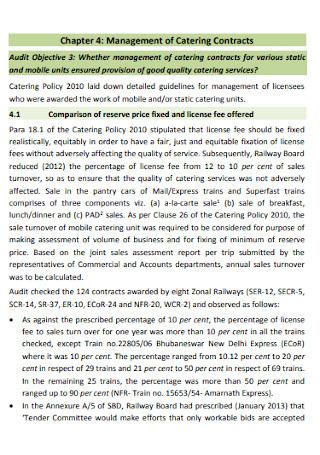
Management of Catering Contracts
download now -
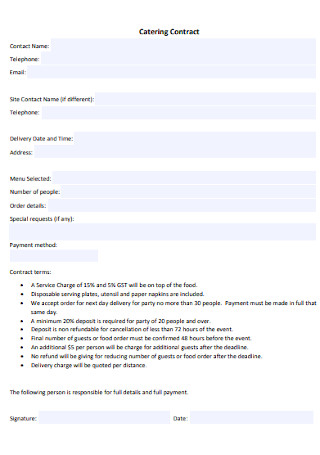
Basic Catering Contract Template
download now -
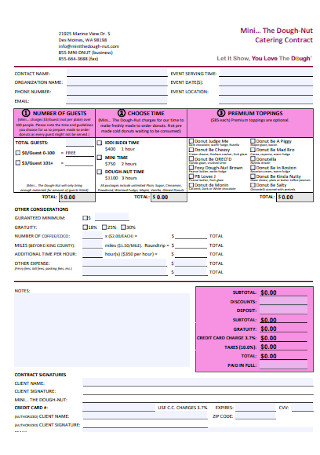
Mini Catering Contract
download now -
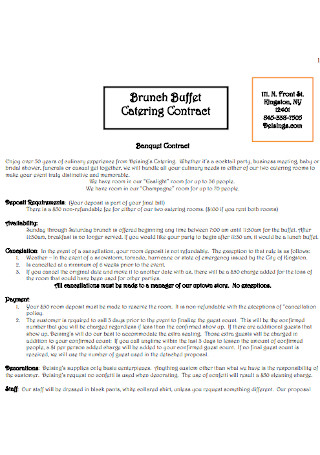
Catering Contract Catering Contract
download now -
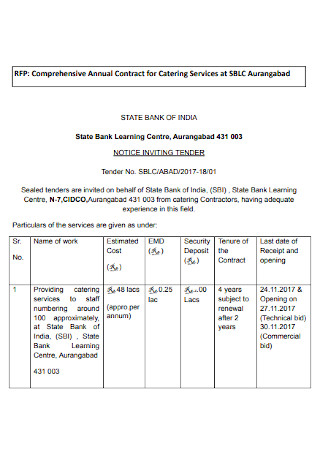
Annual Contract for Catering Services
download now -

Annual Contract for Catering Services
download now -
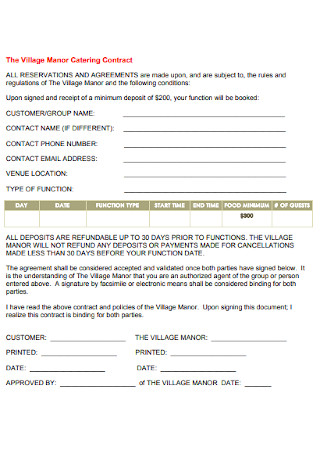
Village Manor Catering Contract
download now -
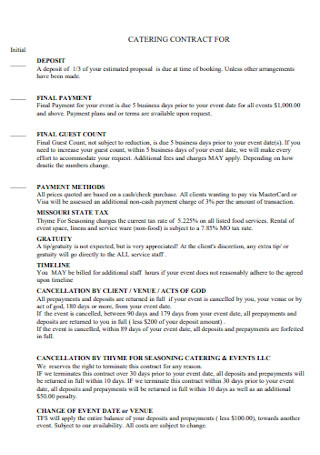
Standard Catering Contract
download now -
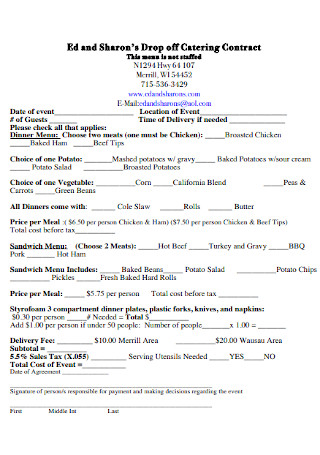
Drop off Catering Contract
download now -
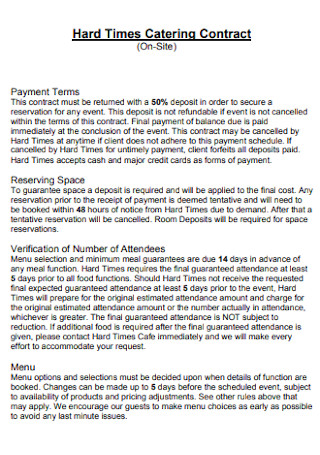
Hard Times Catering Contract
download now -
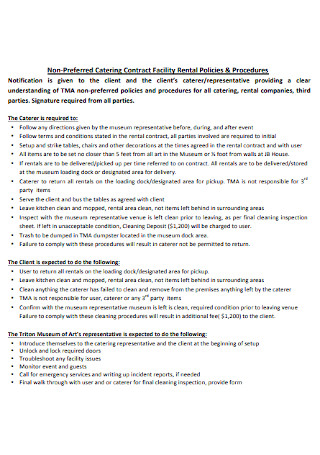
Rental Catering Contract Template
download now -
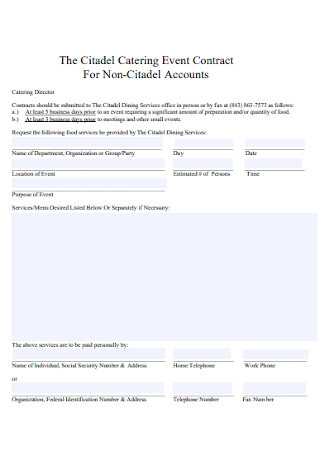
Event Catering Contract
download now -
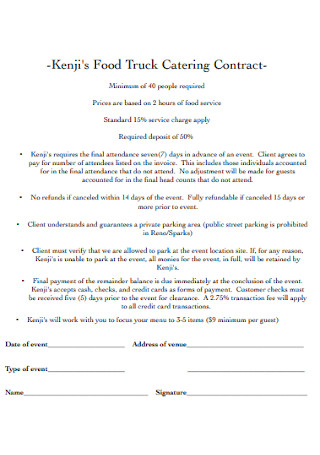
Food Truck Catering Contract
download now -
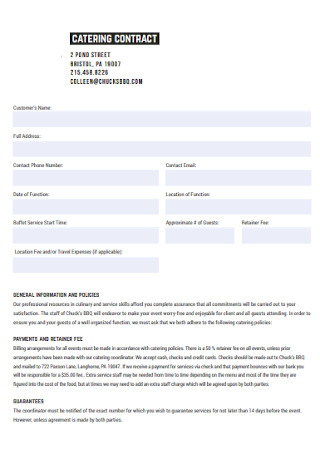
Formal Catering Contract
download now -
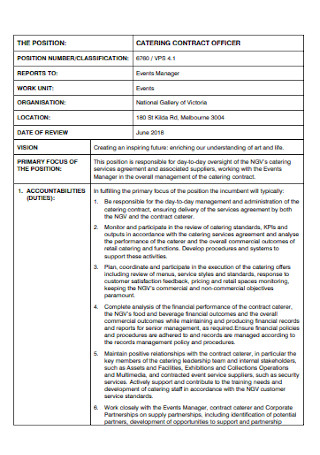
Catering Contract Officer Template
download now -
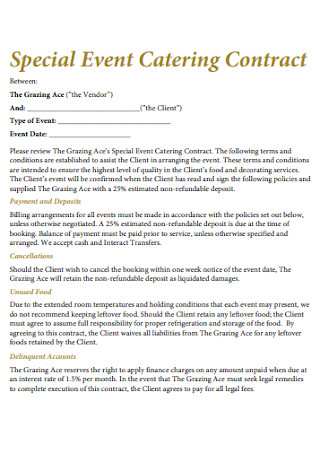
Special Event Catering Contract
download now -
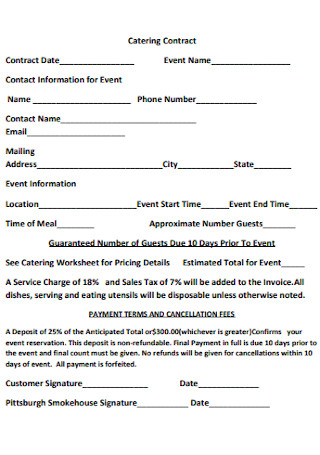
Simple Catering Contract Template
download now -
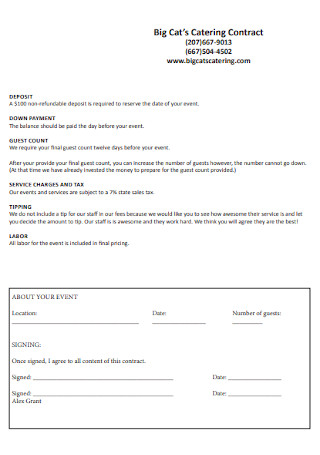
Big Catering Contract
download now -
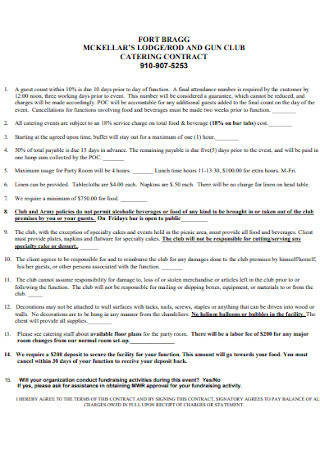
Lodge Catering Contract Template
download now -
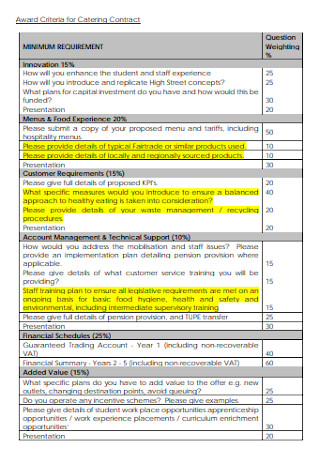
Award Criteria for Catering Contract
download now -
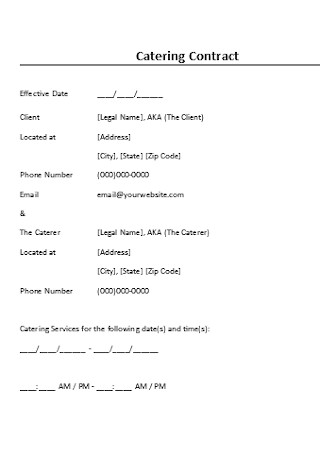
Catering Contract Format
download now -
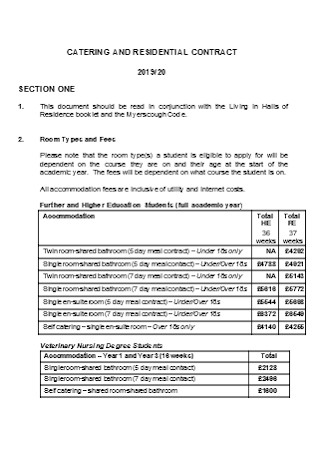
Catering and Residential Contract
download now
FREE Catering Contract s to Download
32+ Sample Catering Contract Templates
How Is a Catering Contract Defined?
Chunks of a Catering Contract: What Are Its Elements?
Who Are Necessary for Catering Services?
How to Prepare a Catering Contract
FAQs
How do you make a catering invoice?
What makes a good catering business?
How do you keep track of each catering order?
How Is a Catering Contract Defined?
First things first, a catering business provides food services for particular events. Meanwhile, a business contract refers to oral or written agreements between parties who are dealing with sales, employment, and more. Combine catering and contract, then—Voila! You have a catering contract. This document refers to the official agreement made between an event organizer and a catering company on how to manage food service provisions for a program. The processes, liability concerns, payments, and catering delivery schedules are part of the deal. Just like any contract, the law gets enforced intentionally. That way, it will be easy to determine what parties allow or prohibit, as stated in the plans under contract. Signatures from each party send a clear message that they have to fulfill the stipulations on the document. If not, then legal consequences come after.
In the U.S., approximately 13 million employees worked under food services back in May 2017.
Additionally, Statista stated that the sales average for the food and drinks restaurant industry in the U.S. reached up to $780 billion in 2016.
On the other hand, Restaurant.org concluded that 63% of consumers would prefer spending for a dining experience compared to buying meals only.
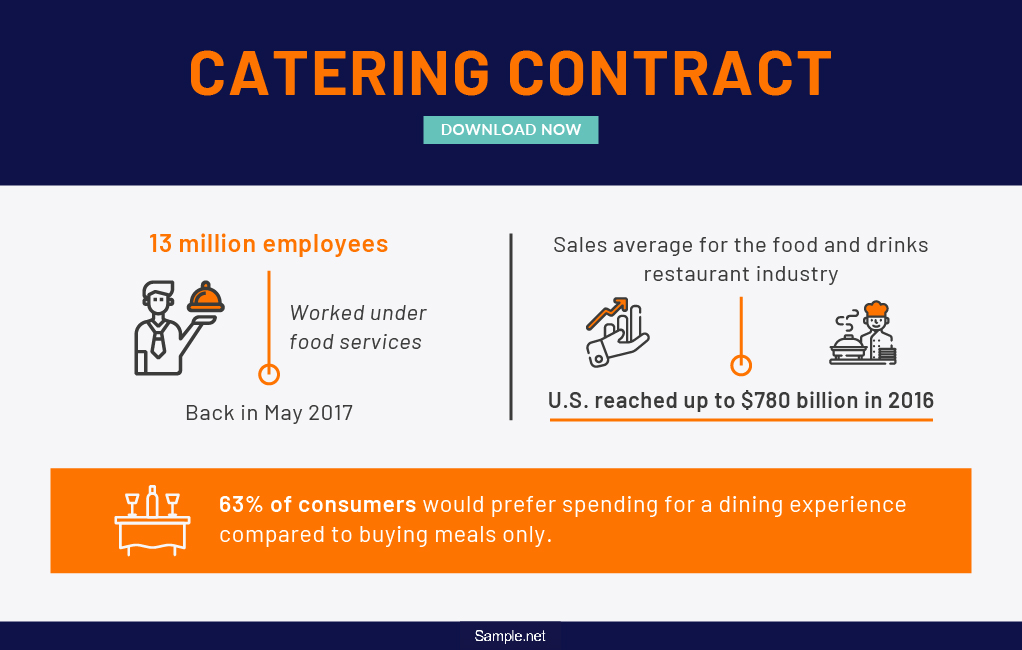
A Historical Mix of the Catering Industry
The food industry is one of the most successful businesses worldwide. In the U.S. alone, the restaurant business food and drink sales reached around $780 billion back in 2016. Catering businesses also contributed to its vast number, and its success also goes down to the practice of catering since ancient times. For example, catering was popular in China back to the 4th millennium BC. Also, catering trades occurred among the Greeks by offering such services to guest houses even in the Roman Empire. In preparing for a banquet or formal feast for kings and noble rulers, you can tell that the catering service became part of its picture for centuries too.
In America, 1778 became notable since Caesar Cranshell made the first grand catering event. Catering eventually became a lucrative business founded by African Americans in 1820. By that point, catering was known for having waiters and restaurant employees. Fast forward to 2006 until now, many restaurants and enterprises have incorporated catering departments to build a bigger brand. For example, having a party means that the catering business will not only serve what is in a restaurant menu. Some services include music and entertainment, floral decors, table and chair provisions, fireworks, and lots more. Thus, more things are up for grabs when it comes to organizing a successful program. Expect to plot it out on a catering contract to finalize how you wish events shall turn out.
Chunks of a Catering Contract: What Are Its Elements?
Indeed, an easy way of understanding a contract is that it is a signed mutual agreement between parties. And just like any other type of this document, a catering contract contains several slices. These slices or parts would be the common contract elements. Without them, your document may be missing out on essential details. Curious about what should be included in a catering contract? Here are its different chunks or elements:
Catering Service Specifications
Upon making the contract, which clients and catering businesses must agree with, the specifications of the catering service require definition. For example, what type of service was asked? Is it for corporate, wedding, restaurant, or maybe social event catering? The point is everyone should have an idea of what the type is to adjust to the event later on. For example, you would not just send out cocktails to a children’s birthday party. Therefore, making changes to fit with its type is essential. More so, a contract should state how many servers are required and what particular food or beverage to offer. Then, you decide on the staffing requirements and menu carefully.
Payment Terms
When it comes to the business side of a catering contract, you must specify the payment plan and terms. Caterers would charge the clients in the end, and the total amount requires confirmation rather than an estimate only. Will the payment be in the form of cash, credit, online payment, or any other arrangement? Also, you may include a proposal about the invoice or offer in an agreement until it gets accepted. Others even propose an installment contract for a better way of paying a big catering service. That happens via a deferred payment rather than a full one-time payment.
Venue Information
The next concern is the location because the fees can increase if the party takes place far away from the city. Therefore, naming the client and business is not enough because the address is vital as well. Give out complete details of the venue to ensure caterers make it to such location. The same goes for time and date. If there is a different menu to serve every hour, then you can provide timesheets for the instructions.
Agreement Conditions and Limitations
Aside from payment terms, the terms of service and other conditions to discuss are crucial too. What do parties allow and disallow? Set those rules and limitations carefully. As contracts are enforceable by law, that means regulations should comply with the law rather than making illegal arrangements. Remember that this section of a contract is one of the important parts because it decides how profitable or successful the agreement will turn out. If the agreement conditions or limitations are absent, then chaos visits.
Who Are Necessary for Catering Services?
Are you starting to decide what food to include in your event’s menu? Take a break for a moment if you still have not clarified the staff necessary for the catering service. Remember that assigning of tasks to different people is significant in organizing events requiring food service. Otherwise, expectations may turn out as a disaster if a single person does the entire task. Mince those services by assigning people for each task. To do that, you recognize the different roles or who are needed for catering services:
How to Prepare a Catering Contract
According to Statista, around 13 million American employees worked under the foodservice industry in May 2017. That number includes those working under catering businesses, too. Having that many workers also shows that many business arrangements are written through contracts. These documents help shape up successful catering services, especially if planned and executed successfully. Just know that you are capable of managing that as well by following these simple steps in preparing a catering contract:
Step 1: Use a Catering Contract Template
Have you checked our sample templates of catering contracts yet? If so, good! You will simply select the appropriate template and whichever you find suitable for your formatting stipulations. Editing is always welcome anyway, so you can adjust its layout and add desired content. Our collection of catering contract templates makes it easier for you to write the catering business agreement as it is pre-formatted. With this, starting from scratch is unnecessary.
Step 2: Define the Parties
Your contract should specify the client’s name, the catering business’s name, and other parties involved. This part is vital for clarification on who is part of this entire agreement. In case someone commits a breach of contract, he or she may not be liable if that person’s name was absent in the contract. Another example that causes a problem is when names have the incorrect spelling as those refer to other people already.
Step 3: Clarify the Specifics for Catering Service
Yes, catering contracts confirm that a catering service is set. However, you still have to expound it further. The event schedule, address, buffet menu list, and other specifications about catering will be present here. To ace this part, it is necessary that you meet and discuss with the other party first. That way, it gets easier to ensure that the parties have agreed upon everything written on the contract.
Step 4: Do Not Leave the Payment Details
Of course, payment terms and details are essential, as mentioned in the elements of a contract above. A client may need to deposit first for caterers to render their service. A detailed presentation of how costs are divided is also essential. You can also convey these details through an invoice or quotation. With this, you show clients how the business budget distribution works. Aside from the total price, you incorporate the fees for booking, tax, insurance, and additional payments.
Step 5: Specify the Terms and Agreement
You do not ignore the governing law, even for the catering contract terms and conditions. Setting the general terms and legal agreements will help a lot to prevent conflicts in the long run. Anyone may back out, so what got stipulated under the catering contract cancellation policy plays its role. Another example is when a catering business might not meet the expected requirements specified in the document. For failing to deliver the obligations, consequences follow. What are these consequences? Those are what is worth discussing in the contract as long as those observe fairness and follow the law.
FAQs
How do you make a catering invoice?
A catering invoice must have the customer and the catering company’s name, billing address, and contact list. Furthermore, you state the event date and time, client identification, and invoice number. You must also list down the goods and services rendered and their respective prices.
What makes a good catering business?
A lot of things make up a good and effective catering company, especially if such a business delivers the services promised under the contract. The main three reasons for what makes it good are the following: (1) customer care, (2) good food and drinks, and (3) effective management.
How do you keep track of each catering order?
You can have plenty of ways to track catering orders, depending on how you manage things. An example is to use an updated contact database for easy tracking. Make sure you have dependable software or tracking charts for listing sales activities and tracing identification numbers and other details too.
One piece of crispy fried chicken, a slice of chocolate cake, or maybe a glass of margarita? Yum! Any food and drink prepared in an event are mostly with the help of a catering service. Moreover, you can say that your next event is in great motion if a detailed plan and mutual agreement with the catering business takes place. With professionally-made templates and the ideas to create your catering contract, rest assured you got the perfect recipe and ingredients to keep events victorious.
